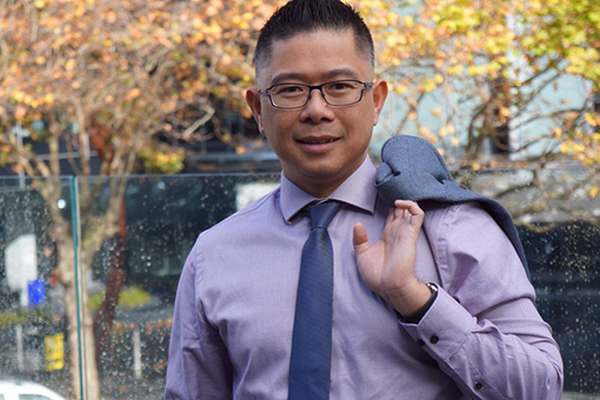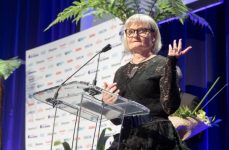Published on the 03/03/2020 | Written by Heather Wright

Govt spreads the CTO load with expert group…
Eighteen months after New Zealand’s plans for a chief technology officer crashed and burned, a new independent ministerial advisory group has risen from the ashes.
The Digital Council for Aotearoa New Zealand, headed by chair Mitchell Pham (pictured), will provide ‘expert impartial advice’ to the Government on how to maximise digital and data-driven technologies ‘to increase equality and inclusivity, wellbeing and community resilience’.
It’s designed to help New Zealand navigate the fast moving digital and data landscape, while putting a distinctly Kiwi spin on things.
The new group includes consultant Roger Dennis, researcher, writer and consultant Marianne Elliott who was co-founder of ActionStation and is co-director of The Workshop; and edtech startup Banqer co-founder and CEO, Kendall Flutey.
“With good expert advice, the government should be better placed to leverage technology for the benefit of all citizens and businesses.”
Rounding out the four men, three women, group are Colin Gavaghan, New Zealand Law Foundation chair in Law and emerging technologies at the University of Otago Faculty of Law; Rachel Kelly, co-founder of the Waikato Technology Cluster, and AI Forum New Zealand Executive Council member; and Nikora Ngaropo, director and founder of NNMD, a Māori-led design and animation technology company.
Minister for Government Digital Services, Kris Faafoi, says “We want to understand the impact of technological change from a uniquely New Zealand perspective, including te ao Māori.
“The Digital Council will also help identify gaps in accessing and using technology, how it can benefit societies and our economy, assist our role in the Pacific and help overcome our distance from major trading markets.”
Pham, in his role as chair, will be paid a daily rate of $920, while other members will receive a daily rate of $692, with reimbursement for expenses, including travel and accommodation provided.
Industry body NZTech (of which Pham is also the chair) welcomed the new group, with chief executive Graeme Muller noting that for the past two election cycles the tech ecosystem has recommended expert advice to help identify the benefits of emerging technologies for New Zealand.
“Technology has been evolving rapidly, so it can be hard for traditional structures like government to keep pace with and identify benefits,” Muller says.
“With good expert advice, the New Zealand government should be better placed to leverage technology for the benefit of all citizens and businesses.”
The Digital Group’s launch comes two years after the government’s high-profile failure in its efforts to establish a CTO, which saw Derek Handley lured back to New Zealand for the role. He was then caught up in political strife when an undisclosed earlier meeting with then Digital Services Minister Clare Curran, during which the role was discussed, and before the position was readvertised, became public. The scandal cost Curran her cabinet position, while the bungled CTO foray saw the government paying Handley compensation after the role was withdrawn.
The role was designed to ‘help drive a forward-looking digital agenda for New Zealand’, working on issues such as improving digital equality, protecting citizens’ rights online and building a connected nation.
Come December 2018, however, Curran’s replacement, Megan Woods, announced it would be difficult to find one person with the skillset to do the CTO role, and the plan changed instead to having a small group of people to help guide New Zealand’s digital future.
The government then implemented the Digital Economy and Digital Inclusion Ministerial Advisory Group (DEDIMAG), which concluded its work programme late last year.
The new Digital Group takes over from DEDIMAG.
“I want to acknowledge the members of DEDIMAG, who have helped shape and enhance our work in areas such as ICT and Innovation procurement along with the research and development tax incentive and e-publishing standards,” Faafoi says.
“Our challenge to the Digital Council is to help government understand how we maximise the wider benefits for our society from access and inclusion in digital and data driven technologies,” he says.
Digital.govt.nz says the Digital Council is ‘uniquely placed’ to act as a bridge and connector between the government, the technology industry and communities across New Zealand, providing external, future focused advice about the impacts of technological change from a whole-of-society perspective.
“The Digital Council will engage broadly to provide advice to the Government on ways to maximise the opportunities, and minimise the risks, that digital transformation can bring.
It says focus areas for the group ‘could’ include:
- Digital inclusion
- Nurturing digital trust and confidence
- Balancing data use and accessibility with safeguarding and privacy
- Government service innovation and digital development
- Enhancing the positive use of data to realise social benefit
- The role of technology in fostering greater social inclusion and community resilience
- The impact of specific technologies, such as AI and algorithms, on aspects of New Zealand society.



























